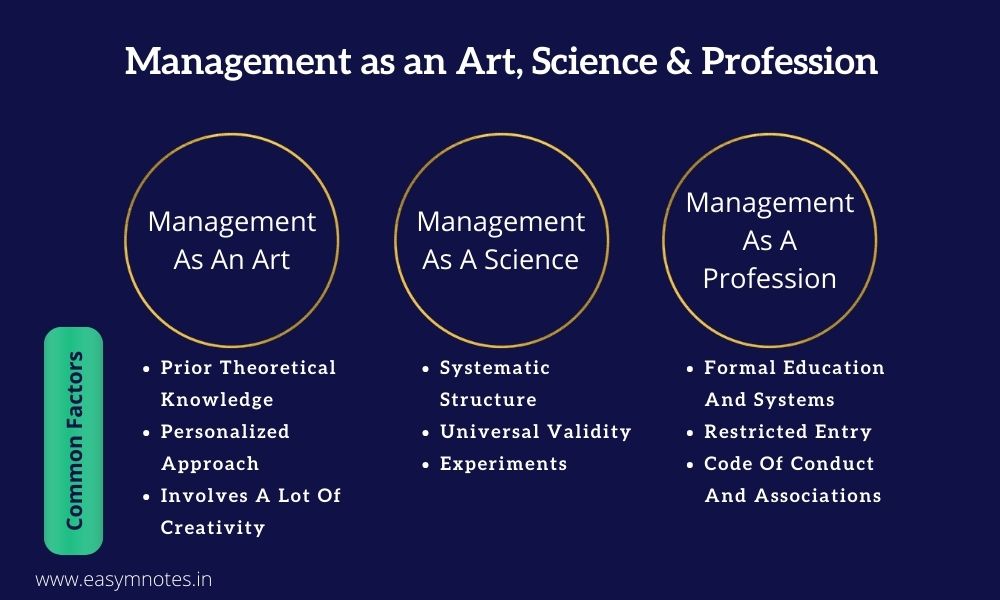
Management can be understood from various perspectives, and there are a lot of ways to define Management. Specific characteristics of Management signify that Management is a form of science, art, and profession in some cases.
In this page, we will be discussing all the three points of view to ascertain the exact meaning and understand in depth. After you understand all the perspectives, the conclusion answers the question and allegiance of Management to one of the three domains.
Management as art
To understand Management as an art form, we should first understand the meaning of art. Art is defined as the ability to use information and skills to get the desired results. Artists have the ability to come up with unique solutions and art forms for complicated problems.
The analogy stands upright in Management as managers come up with unique and creative solutions to business challenges. There are no predefined solutions to business problems, and using hundreds of ways to build new processes is a normal part of Management.
To understand in-depth, let’s analyze critical factors that are common in Management and art –
Prior theoretical knowledge
Every art form and artist uses predefined expertise and data to build upon their ideas. Theories in public speaking, acting school basics for actors, knowledge of tones in music, etc. are all examples of theoretical knowledge which is used in specific art forms. Similarly, in Management, professionals are given workflows and blueprints to analyze, test, and execute business ideas.
Personalized approach
Every artist has its own view of building forms of art. For example, every musician has its own style; every painter prefers a specific niche, etc. Similarly, in Management, every professional has its own way of approaching problems and suggesting solutions.
Involves a lot of creativity
Every art form is heavily dependent on creativity. Creative thinking produces beautiful art and is unique to the best artists. Similarly, in Management, innovative solutions have given birth to amazing companies and benchmark management principles that are used worldwide.

Management as Science
Let’s start with the definition of science. Science is an organized collection of knowledge that has an explanation on the basis of facts for every phenomenon. The concepts and hypotheses of science are all defined with principles, and a similar thing is practiced in Management.
Like art, Management also shares key factors with science, which can quickly help us term Management as a science.
Let’s discuss the common factors –
Systematic structure
Subjects of science like Chemistry and physics have defined systematic principles and divisions. Each subsection has another set of principles that help you experiment with new things in a particular domain. Similarly, Management has a systematic structure of divisions and principles. Every principle can be used as a reference while experimenting with new things.
Universal validity
The concepts and basic principles of Management have universal validity. For example, the principles used in finance management are similar in every company, and the rules are valid universally. These sets of principles do not change with situations and applications.
Experiments
Concepts and principles of science are predefined and are always experimented with trial and error to justify them and bring new inventions. Similarly, concepts in Management are often tested to improve business practices.
Management as a profession
A profession is a form of occupation in which a person renders his/her services after acquiring expertise in a particular domain. The professional is remunerated by the company for which he/she renders the services.
The profession involves a contract between a company and the professional for a specific period, and the entry factors for the role are limited by various factors.
The significant factors of professions which are familiar to Management are
Formal Education and systems
Like any profession, Management contains formal levels of education and building systems to reach desired positions. To join the Management of large corporations, students join and excel in degrees like BBA, MBA, etc.
Restricted entry
Entry to any management role is possible only for candidates with certain set entry criteria. These criteria include educational qualifications, experience, efficiency, knowledge of specific software, etc.
Code of conduct and associations
Management, like any other profession, contains a code of conduct and ethics that every manager has to abide by. The presence of various management associations is there, which regulates and certifies managers for specific skills.
You must have understood the standard features of Management, art, science, and profession. You might read about Management belonging to one of the three categories. But as we can identify, Management is a mixture of all three types.
Also Read: Definition of Management
You can categorize Management into something as it is a combination of various factors, all of which combine to create processes to bring disruptions in society. Optimum usage of procedures in Management can help organizations achieve all imaginary feats in their particular domains.
Management: A Blend of Art, Science, and Profession
Management has a complex structure. It has been the subject of much comparison and analysis. It is a combination of art, science, and profession. Here, you will explore the unique characteristics of management as it relates to three perspectives to get a better understanding of this process.
Management as an Art
Business is a dynamic world. Successful managers should have the art to solve the problems. They should also have flexibility requirements to modify their work to new heights. There are some of the features of management as an art.
- Creativity: Managers must be creative. Every manager should create innovations to raise the next level in the business. This quality is developed with experience. Experienced managers bring more changes to the situation.
- Personal Skills: Every manager, being an individual, is different. A good manager must have good skills in facing human problems. He should use his skills to know the problem, assign work properly to the employees, give the right suggestions, and understand how to deal with various situations in business.
- Keep Regular Practice: Practice makes a man perfect. This rule should always be applied by the manager. The more experience, the more the manager will be able to face any challenges or complex situations with ease. He is in a position to make the required changes according to the situation,
Management as Science
A significant amount of theoretical knowledge, comprising ideas, models, and principles that have been created via investigation and testing, is the foundation of management. Managers have a framework for comprehending organizational behavior and decision-making thanks to these scientific bases.
- Data-Driven Decision-Making: Evidence-based procedures and data analysis are prerequisites for effective management. Managers evaluate performance, pinpoint areas for development, and make decisions based on both quantitative and qualitative data. Decisions made using this scientific method are guaranteed to be supported by data rather than just gut feeling.
- Improvement through Constant Learning: The dynamic world of management necessitates constant education and training. In order to maintain their competitive edge, managers need to keep up with the most recent findings, theories, and industry standards. Continuous improvement is a commitment that is consistent with the scientific method of knowledge acquisition and progress.
- Control and Predictability: Although there is a degree of uncertainty in management, scientific concepts can be used to predict trends, reduce risks, and set up procedures and systems that enhance efficacy and efficiency. To achieve organizational stability and success, this emphasis on control and predictability is crucial.
Management as Profession
Management individuals mainly participate in professional situations that provide better networking support, continuing education, and opportunities for professional development. Management, as a part of a professional association, can contribute to the development and maintenance of standards.
- Formal Education: Professionals need formal education. Today’s managers are qualified with management degrees from reputable institutes. They also undergo formal training from management schools in order to work professionally.
- Expertise: A professional is an expert in his field. The manager must have gained a lot of knowledge and skills in practicing as a professional. He became an expert due to regular practice in a specific field.
- Registration: Professionals should register themselves with their association. For example, chartered accountants should connect themselves with chartered accountants in India, whereas managers do not need to register with anybody. They can take the membership of chambers of commerce to get the membership benefits.
With aspects of science, art, and profession, management is unquestionably a complicated and multidimensional discipline. In contrast to the scientific perspective, which emphasizes data, analysis, and systematic procedures, the artistic side of management places more emphasis on creativity, intuition, and people skills.
Conclusion
You must have understood the standard features of Management, art, science, and profession. You might read about Management belonging to one of the three categories. But as we can identify, Management is a mixture of all three types.
Also Read: Definition of Management
You can categorize Management into something as it is a combination of various factors, all of which combine to create processes to bring disruptions in society. Optimum usage of procedures in Management can help organizations achieve all imaginary feats in their particular domains.
